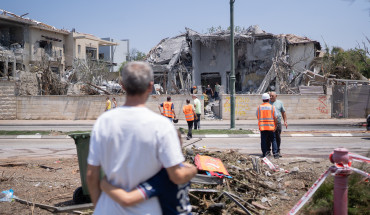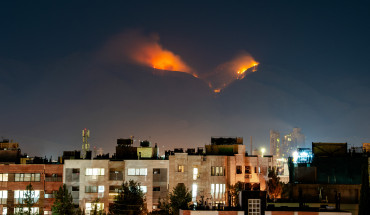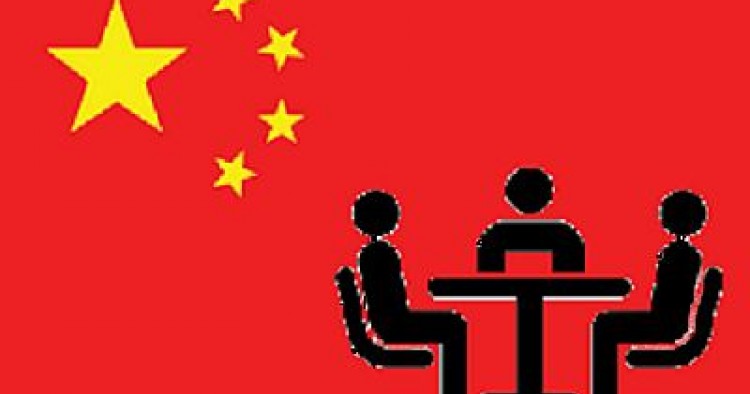This essay is part of the series “All About China”—a journey into the history and diverse culture of China through essays that shed light on the lasting imprint of China’s past encounters with the Islamic world as well as an exploration of the increasingly vibrant and complex dynamics of contemporary Sino-Middle Eastern relations. Read more ...
Mediation diplomacy has emerged as one of the central pillars of China’s foreign policy objectives and practice, with Beijing deliberately positioning itself as a peacemaker in the Middle East conflicts and crises in the region (e.g., Afghanistan, Syria, Sudan, Yemen, Iran, and the Israeli-Palestinian peace process). This article examines whether China's mediation diplomacy in the Middle East is a precursor of change in China’s interpretation and application of the principle of non-intervention.[1] The main argument is that China’s mediation role is part of a carefully devised conflict management strategy that suits the country’s non-intervention policy. China is becoming more deeply and more proactively involved diplomatically, seeking to shape the political and security developments in the Middle East. Thus, the role of peace broker is a ‘legitimate way’ to intervene in the domestic politics of other states without departing from its traditional guiding principle, and to promote or to secure its own economic interests and political influence in the region.
*****
Over the decades, many global and regional players have intervened at some point in the Middle East conflicts as peace brokers. The U.S, the E.U., Russia, and regional powers (e.g., Egypt, Turkey and Saudi Arabia) and major international organizations have all tried — without noticeable success — to broker a lasting peace and security in the region. China, unlike the other players, carries no religious, political, historical, and colonial baggage, making it an ideal candidate to break the gridlocks in the region’s conflicts and to play the role of an ‘honest broker.’ While China’s treatment of its Uyghur minority in Xinjiang province could cast a shadow over its image of impartiality in the Islamic world and the Middle East,[2] nonetheless, China is still in a better position to mediate conflicts there than the other brokers.
Mediation diplomacy helps Beijing cultivate an image — for domestic domestic and international audiences alike — of being an honest broker interested in building peace and stability in the Middle East. This brings China a more visible profile and higher stature, which enhances both its national and international prestige. Nevertheless, garnering prestige and visibility is not the only driving force behind China’s mediation diplomacy. Equally important is the growing imperative of competing to obtain power and influence in the wider transformation of the regional balance of power, with Beijing using mediation to further its own economic interests and political influence in those countries and areas where some of its strategic rivals had previously been dominant.
Mediation is an integral part of a foreign policy and instrumental diplomacy that derives from the country’s diplomatic and political goals, both domestic and international.[3] Ways of dealing with or managing international conflicts may range from avoidance and withdrawal, through bilateral negotiation, to various forms of third-party intervention.[4] While definitions of and approaches to mediation vary, it is commonly understood as the intervention of more than one third party involved in the dispute settlement efforts, for the purpose of improving the nature of interaction or facilitating communication between the disputants.[5] Mediation is a conflict resolution tool that requires the acceptance and cooperation of the adversaries, and as such, mediation diplomacy initiated and performed only on a voluntary and nonviolent basis, and its proposals or recommendations are non-binding.[6]
The practice of settling or managing conflicts through mediators has had a rich and long history in both Western and non-Western cultures.[7] In the history of mediation diplomacy, China has rarely played the role of mediator in international conflicts. Since its founding in 1949, China has generally refrained from engaging in international or regional mediation initiatives for several reasons. First, the principle of non-intervention remains at the core of China’s diplomatic philosophy. Second, Beijing believes that, in most cases, the status of neutral onlooker is conducive to maximizing its national interest, as it leaves more room to maneuver in diplomatic efforts. Finally, China prefers to pursue diplomacy in a peaceful, friendly manner and to avoid confrontation and conflict, unless it impinges on its core interests, such as sovereignty, security, and territorial integrity.[8] This trend, however, has begun to change as a result of the country’s increasingly international status, coupled with the intensification of unresolved and newly emerging conflicts that are threatening its core interests and security.[9]
Mediation diplomacy in Chinese culture is unique and differs significantly from Western-style mediation.[10] Whereas the latter approach endorses an individualistic utilitarian value system of fairness, justice, equality, equity, and autonomy, Chinese mediation diplomacy embraces a unique Confucianism humanistic/moralistic value system consisting of social harmony, moderation, respect for authority, humility, and benevolence.[11] In Chinese culture, mediation reflects a value, tradition, and practice central to arranging the social order, world order, and even universal order, in the pursuit of harmony.
Chinese mediation is characterized by extreme flexibility of role-playing and is governed by two tenets: 1) flexibility, which affords mediators room to maneuver and to adapt to changing circumstances and make adjustments, as required; and 2) the exercise of great care in determining whether to pursue bilateral or multilateral channels of mediation. These tenets are reflected in the different roles China has assumed in mediation: as chief mediator in multilateral negotiations; as a participant in multilateral processes, mediating as required, privately and from the sidelines, on the basis of bilateral relationships; as a sideline mediator through bilateral channels; and by taking part in ad hoc mediation efforts through serving as a balancing force to hedge off conflict.[12]
In the Middle East, the U.S, and other players are perceived to have manifold agendas and interests across the area. Therefore, the mediation process is frequently seen as a means of furthering their own specific interests and goals. China’s traditional stance toward the Middle East, as all other regions of the world, has been based on the principles of sovereignty and non-intervention in internal affairs.[13] However, there has always been a degree of flexibility and pragmatism in how Beijing conducts its foreign policy, especially when it comes to non-intervention practice. Specifically, China does not involve itself in the internal affairs of other countries, unless its own national or economic interests are in danger or at risk.[14]
In recent years, China has gradually integrated itself into and expanded its presence within the Middle East; and its foreign policy has become subtler and more sophisticated, with a growing inconsistency between its principles and practice. Its more flexible and pragmatic interpretive approach and implementation of the principle of non-intervention,[15] are driven by Beijing's growing need for imports of energy and raw materials in order to maintain domestic economic growth and stability, which continues to be the top priority for the Chinese regime as a means of bolstering its legitimacy.[16] The widespread political instability in the region has caused Beijing to become more deeply and more proactively involved, in order to protect its own interests,[17] with the result that the Middle East countries increasingly expect that China will become a stabilizing actor in regional political and security affairs, including by playing an active role in conflict settlement efforts.[18]
However, Beijing is not yet ready to assume such responsibilities. Instead, its efforts have focused mainly on conflict management measures, such as calling for a reduction of tension, conducting dialogues between disputing parties, and extending offers to play a mediating role in some of the crises and conflicts in the wider region (e.g., in Afghanistan, Syria, Sudan, and Iran). Moreover, China seeks to manage the disputes in the Middle East by strengthening bilateral and multilateral cooperation with other great powers and regional organizations (e.g., in addressing the Iranian nuclear crisis and the Syrian civil war). Thus, while adhering to its fundamental and uncompromising principle of non-intervention, China's flexible approach has created certain criteria for developing a role as conflict manager and peace broker. Since China's mediation diplomacy is initiated and performed only on a voluntary basis, and its recommendations are non-binding, its mediator role is the ‘legitimate way’ to intervene or to influence the domestic politics of other states, and to protect its national economic, as well as to promote its political interests in the region.
More importantly, Beijing’s mediation diplomacy in the Middle East conflicts should be viewed through the prism of ‘Chinese characteristics’ of conflict management. Beijing’s willingness to play the role of mediator in conflict perfectly suits its non-intervention policy framework, which is limited to participating in multilateral peace mediation and projecting a positive image of a reliable regional power or key stakeholder. Chinese mediation diplomacy always aim to include and mobilize all local forces or groups concerned while outside forces can only play a supporting role.
The frequent and ongoing crises in the Middle East provide a unique opportunity for China’s diplomats to broaden their experience with multilateral global crisis conflict management and mediation. The ability to shape the resolution of international conflicts is central to Chinese president Xi Jinping’s vision of an assertive China taking on more international responsibilities that reflect its status as a great power. In pursuit of this vision, Chinese diplomats are now involved in more regional negotiations than ever before (e.g., Qatar crisis and Yemen civil war).[19] However, it is doubtful that China’s involvement can contribute to either a resolution of the conflicts or a mitigation of the disputes, since Chinese negotiators lack experience in conflict resolution in the region.[20] China is also very reluctant to expand its mediation diplomacy in the Middle East conflicts because it fears being embroiled in regional tensions and controversies. The role of an active mediator and greater engagement in the region would come at the cost of blood, treasure, and an end to its reputation as neutral player.[21]
Officially, China still adheres to its non-intervention principles and thus keeps a low, cautious profile in Middle East affairs. Nevertheless, despite the official policy agenda, there has recently been a noticeable rise in Chinese mediation activities in region (e.g., Afghanistan, Syria, and the Israeli-Palestinian conflict).[22] Such activities are visible in the economic field, and at the bilateral or multilateral diplomatic levels. China’s mediation effort in these regional hotspots offers important insights into how China’s conflict management diplomacy has become more proactive and interventionist today, while formally continuing to adhere to the principle of non-intervention.
China's mediation diplomacy is part of a carefully devised strategy that suits the country’s non-intervention policy framework. Accordingly, Chinese mediation diplomacy is mostly aimed at conflict management rather than conflict resolution. Thus, China's ongoing intervention in the Middle East affairs is mainly related to keeping the peace and stability, managing conflicts, and seeking regional security. Beijing certainly has the capabilities to intervene, but has lacked the will to get heavily involved in military conflict in the region, as everywhere else in the world, limiting itself to participating in multilateral peace mediation. However, Chinese mediation has a unique style that differs significantly from the U.S. or Russia, being an effective, non-confrontational, and hence, preferred, mechanism for resolving disputes in the region. China may be the only mediator that can bring all the opponents to the negotiating table, as it did in the case of Afghanistan.[23]
While in the past China tended to leave Middle East mediation diplomacy to the other permanent members of the UN Security Council, it is now trying to become more involved and to play the peace broker in regional affairs. Over the years, Beijing has played such a role in the resolution of the Darfur issue in Sudan, and was instrumental in persuading Iran to agree to the Joint Comprehensive Plan of Action conflict (JCPOA),[24] in addition to mediating between Afghan government representatives and the Taliban, as well as Syria and Yemen. However, whether these Chinese mediation initiatives achieved practical results remains questionable.
For the time being, U.S., Russia or the European powers continue to be the most significant extra-regional actors in the Middle East conflicts, while Beijing is still a marginal and deliberately cautious player. China involvement in the region is mainly economic (i.e., energy security and implementing the Belt and Road Initiative). However, the region has been in a state of chaos for many decades, with each passing year bringing a new wave of instability. Washington and other power players have thus failed to bring peace to the region. This reinforces China's determination to content itself with the extremely limited role of honest broker, whose mediation efforts in the Middle East disputes are mostly aimed at conflict management.
[1] This article is adapted from Mordechai Chaziza, “China Mediation Efforts in the Middle East and North Africa: Constructive Conflict Management,” Strategic Analysis 42, 1 (2018): 29-41.
[2] Robert R. Bianchi, “The Perception of the 2009 Ürümqi Conflict across the Islamic World,” in Niv Horesh (ed.), Toward Well-Oiled Relations? China’s Presence in the Middle East following the Arab Spring (London, UK: Palgrave Macmillan, 2016): 48-68.
[3] Saadia Touval, “Mediation and Foreign Policy,” International Studies Review 5, 4 (December 2003): 91-95.
[4] Jacob Bercovitch and Allison Houston, “The Study of International Mediation: Theoretical Issues and Empirical Evidence,” in Jacob Bercovitch (ed.), Resolving International Conflicts: The Theory and Practice of Mediation (Boulder, CO: Lynne Rienner, Publishers, 1996): 11-36.
[5] Kenneth Kressel and Dean G. Pruitt, Mediation Research (San Francisco, CA: Jossey-Bass, 1989).
[6] Touval, “Mediation and Foreign Policy,” 91-95.
[7] Philip H. Gulliver, Disputes and Negotiations: Cross-Cultural Perspectives (New York: Academic Press, 1979).
[8] Wu Xiaohui (Anne) and Cheng (Jason) Qian, “The Art of China’s Mediation during the Nuclear Crisis on the Korean Peninsula,” Asian Affairs 36, 2 (2009): 79-96.
[9] Dan Large, “China’s role in the mediation and resolution of conflict in Africa," Paper presented at the OSLO Forum 2008- The OSLO forum Network of Mediators, Oslo, 2008, accessed December 18, 2017, file:///C:/Users/moti/Downloads/Chinas_Role_in_the_Mediation_and_Resolution_of_Conflict_in_Africa.pdf.
[10] Jia Wenshan, Ma Yun and Yang, Libin, “The Current Status of Mediation in Building and Sustaining Social Harmony in Rural China: A Case Study of Xunyang County, Shaanxi Province, P. R. China," Paper presented at the annual meeting of the NCA 94th Annual Convention, San Diego, CA, 2009. <Not Available>. 2014-11-30 from http://citation.allacademic.com/meta/p257842_index.html.
[11] Zhaoxing Li, “Peace, Development and Cooperation-Banner for China’s Diplomacy in the New Era,” Chinese Journal of International Law 4, 2 (2005): 677-683.
[12] Wu and Cheng, “The Art of China’s Mediation during the Nuclear Crisis on the Korean Peninsula,” 79-96.
[13] Yitzhak Shichor, “Fundamentally Unacceptable yet Occasionally Unavoidable: China’s Options on External Interference in the Middle East,” China Report 49, 1(2013): 25-41.
[14] Mordechai Chaziza and Ogen S. Goldman, “What factors increase the probability of Chinese interventions in intrastate wars?,” Asian Journal of Political Science 24, 1 (2016): 1-20.
[15] Shichor, “Fundamentally Unacceptable yet Occasionally Unavoidable,” 25-41.
[16] Francois Godement, “The End of Non-Interference,” China Analysis, October 24, 2013, accessed December 18, 2017, http://www.ecfr.eu/page//China_Analysis_The_End_of_Non_interference_October2013.pdf.
[17] Wang Yizhou, “Creative Involvement: A New Direction in Chinese Diplomacy,” in Marc Leonard, (ed.), China 3.0. (London, UK: European Council on Foreign Relations, 2012): 106-111.
[18] Qian Xuewen, “Zhongdong Jubian dui Zhongguo Haiwai Liyi de Yingxiang,” [The Impact of Middle East Turmoil on China’s Overseas Interests], Alabo Shijie Yanjiu [Arab World Studies], 6, 2012, p. 51.
[19] Rob Edens, “The China Wildcard in the Qatar Crisis,” The Diplomat, August 9, 2017, accessed December 18, 2017, https://thediplomat.com/2017/08/the-china-wildcard-in-the-qatar-crisis/.
[20] Moritz Rudolf, “China’s New Era of Diplomacy: Engaging in Syria,” The Diplomat, January 25, 2016, accessed December 18, 2017, https://thediplomat.com/2016/01/chinas-new-era-of-diplomacy-engaging-in-syria/.
[21] Andrew Scobell and Alireza Nader, China in the Middle East: The Wary Dragon (Santa Monica, CA: RAND Corporation, 2016).
[22] Yoram Evron, “China’s Diplomatic Initiatives in the Middle East: The Quest for a Great Power Role in the Region," International Relations 31, 2 (2017): 125-144.
[23] Catherine Putz, “China Help Mediate Between Afghanistan and Pakistan?,” The Diplomat, June 13, 2017, accessed December 18, 2017, https://thediplomat.com/2017/06/can-china-help-mediate-between-afghanistan-and-pakistan/.
[24] “China plays important role in Iran nuclear talks: UN chief,” Xinhua, July 22, 2015, accessed December 18, 2017, http://news.xinhuanet.com/english/2015-07/22/c_134436711.htm; Dan Large, “China’s role in the mediation and resolution of conflict in Africa,” The OSLO forum Network of Mediators, 2008, accessed December 18, 2017, http://www.hdcentre.org/uploads/tx_news/20DanLargeChinainAfricaWEB.pdf.
The Middle East Institute (MEI) is an independent, non-partisan, non-for-profit, educational organization. It does not engage in advocacy and its scholars’ opinions are their own. MEI welcomes financial donations, but retains sole editorial control over its work and its publications reflect only the authors’ views. For a listing of MEI donors, please click here.













